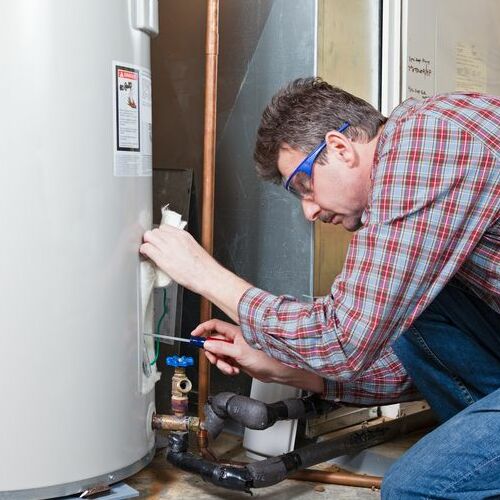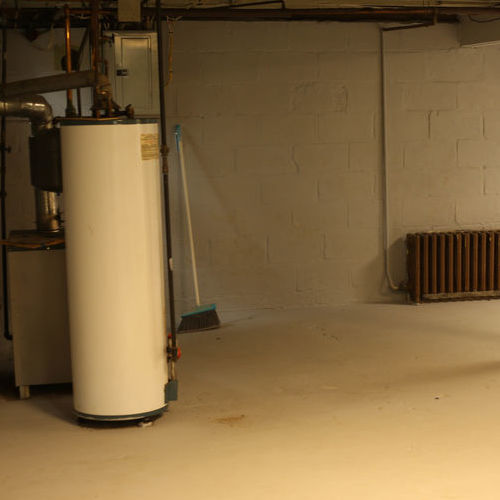
What happens when your water heater bursts?
When you have a water heater burst, you are going to have a major mess to clean up, one that can add up quickly. To prevent such a mess, you may want to know, “Why does a water heater burst?” There are three main reasons a water heater might burst, as outlined below.
- Sediment build-up: Minerals from hard water build up in the tank over time. As the sediment builds up, it takes the water longer to heat, which, in turn, causes overheating and deterioration.
- A rusted or corroded tank: If the anode rod in your tank has rusted out, your tank will soon begin to rust as well. Check the anode rod every two years, and replace it if it is rusted.
- Internal pressure is too high: If the temperature is set too high, the temperature and pressure relief valve will release water too frequently to keep the pressure down. If the valve malfunctions or breaks, the same problem can occur. Too much pressure causes the water heater to burst.
If your water heater does unfortunately burst, and you need immediate water heater cleanup in Broward, Palm Beach, and Miami-Dade Counties, FL, reach out to the professionals at Restore Experts, Inc.. We can be ready to help you at a moment’s notice. All you need to do is call (954) 548-5613.
What are the signs of a hot water heater going bad?
If you want to avoid a water heater burst, you want to keep an eye out for some signs the water heater is wearing out. Of course, age is one thing that will create problems for your water heater. If the water heater is more than 10 years old you may have begun to experience some problems with it, and the older it gets the more problems you may experience. All of these could add up a burst unit. One major sign you have a problem is rusty or brown water coming out of your faucets or shower. This is a sure sign that either your pipes or water heat tank are rusted. You can test the water heater by draining the tank into several five-gallon buckets. If there is rusty water in the third bucket, the tank is normally the problem.
If you are hearing rumbling noises or other odd noises coming from the tank, this usually indicates serious sediment build-up. This build-up can cause overheating, which can lead to a burst. Another sign of problems is leaking. If there is water on the tank or on the ground around the tank, you likely have a leak. Call out a plumbing professional to take a look at the unit. There may just be a loose connection or a more serious problem that could require you to replace the unit.
Can you still use water if water heater is leaking?
You can still use your water if your water heater is leaking. If your tank is leaking, however, you will want to get a plumbing professional out to check the unit. Letting a tank leak for too long could lead to a water heater burst. Having the unit repaired or replaced is a better option. While a leak may not seem serious, it not only could indicate your tank is damaged, the water could damage the area where the water heater is housed.
Is a broken water heater an emergency?
A broken water heater isn’t necessarily an emergency. In some instances, you may just need a connection tightened, while others you’ll want to get help immediately. Of course, the sooner repairs are made, the better. Letting problems go on too long can lead to costly repairs or premature replacement. If you have a water heater burst, you definitely have an emergency situation. Not only will you want to get help from a plumbing professional, but you’ll also need to get help from a clean-up service like Restore Experts, Inc.. Burst water heaters can cause serious damage to your property, including major water damage.
Whenever a burst occurs, whether a water heater burst in garage or a water heater burst in apartment or anywhere else, before help arrives to clean up the situation and make repairs, you’ll want to take action to prevent further damage. The first thing you’ll want to do is shut off the cold water supply line that connects the water heater to the main water line. The line is at the top of the water heater. You will also want to shut off the electricity or gas flow to the water heater. You can cut the power to the unit by switching off the breaker or switch off the gas line if it is gas-powered. If you shut off a gas unit, leave your home until the gas smell dissipates.
Should you drain your water heater?
Draining your water heater at least once per year is actually a good idea. This helps clear out sediment from hard water. Sediment build-up can cause your water heater to work harder and overheat, which can lead to a water heater burst. You can also drain your water heater to check to see if the tank is rusty. If, after three bucketfuls of water, the water appears rusty, your tank is rusted and will need to be replaced.
Hot water heater burst insurance
While homeowner’s insurance usually doesn’t cover flooding, you may actually be able to get help from your insurance company if your water heater bursts. As with a burst pipe, the event must come on suddenly, and by accident. If the water heater bursts because it’s aging and in disrepair, it won’t be covered by the insurance company.

Call Today
If you’ve had a water heater burst in Broward, Palm Beach, and Miami-Dade Counties, FL, the team to turn to for fast response is Restore Experts, Inc.. We can get to you for clean-up quickly. Reach out to us at (954) 548-5613 for immediate assistance.

